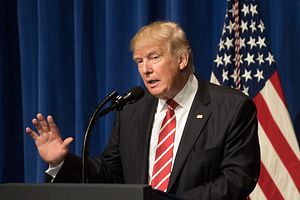U.S. President Donald Trump’s remarkable decision to rebuke his own secretary of state’s attempt at pursuing diplomacy with North Korea last week was a dangerous move at a dangerous time.
Trump took to Twitter to urge Rex Tillerson, who was in China to discuss North Korea among other matters with top Chinese officials, to save his energy, adding that the United States would “do what has to be done”.
And so Trump, just weeks after threatening to “totally destroy” North Korea before scores of world leaders in New York, added another ambiguous, deterrence-degrading threat to his portfolio of threats against North Korea.
Hours later, Trump picked up his phone again: “Being nice to Rocket Man hasn’t worked in 25 years, why would it work now? Clinton failed, Bush failed, and Obama failed. I won’t fail.” (Never mind that Kim Jong-un was a child 25 years ago.)
While speaking to the media in China, Tillerson, in remarks that were widely misinterpreted, implied that the United States had been “probing” for diplomatic talks with North Korea.
He said the U.S. had “lines of communications to Pyongyang” – a wholly mundane admission given the well-known existence of the so-called New York channel between North Korea’s permanent mission to the United Nations and U.S. diplomats.
“We’re not in a dark situation, a blackout,” Tillerson said. “We have a couple, three channels open to Pyongyang. We can talk to them. We do talk to them,” he said.
Analysts took these words to imply that secret backchannel talks on issues of substance were ongoing when, instead, all Tillerson likely meant was that the New York channel remained open and various Track 1.5 dialogues were ongoing. (Track 1.5 refers to dialogues with official participants on one – the North Korean – side with independent analysts, experts and former officials on the other.)
The New York channel was confirmed to be operational earlier this summer, of course. It was how the United States was able to secure the release of Otto Warmbier, the US student who returned home from North Korea after 17 months of imprisonment in a comatose state. Warmbier died and would later be mentioned in Trump’s speech at the UN General Assembly – the same speech in which he threatened to “totally destroy” North Korea.
Rebuking Tillerson not only degrades his already low ability to serve as an effective representative for U.S. interests abroad, but all but assures that North Korea, long insecure at the prospect that the United States will strike it, will treat any future diplomatic overture with skepticism.
Moreover, Trump’s reaction to Tillerson’s words suggests something even more concerning: the president of the United States is receiving his information on U.S. diplomatic efforts towards North Korea from the press.
Reading reporting of Tillerson’s statement in Beijing, it would have seemed that the acknowledgement was truly something remarkable – that despite the missile launches and war of words that has been ongoing since August between Kim and Trump – the U.S. had found a way to break the cycle of crisis and enter talks.
That could not be further from the truth, of course. The situation between Washington and Pyongyang remains as serious now as it did when Tillerson travelled to Beijing. Trump’s words ensure that it will remain that way instead of providing an opening for de-escalation.
North Korea will not have missed the message – indeed, messages – over these past few weeks. The world is now anticipating a long-range launch of its Hwasong-14 intercontinental ballistic missile over Japan, to demonstrate to its remaining doubters that it possesses the capability to strike the U.S. homeland.
It is long past time for the United States to get its act together on North Korea policy.
This article first appeared at the South China Morning Post. It is republished here with kind permission.

































